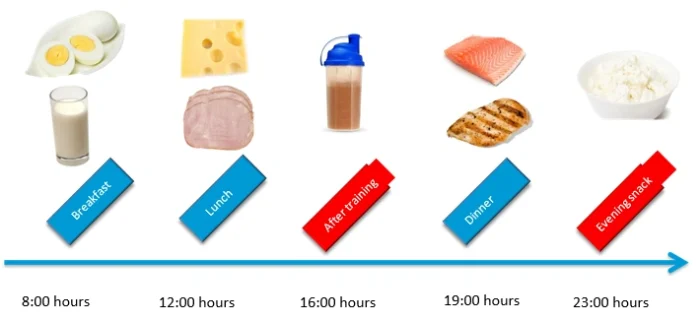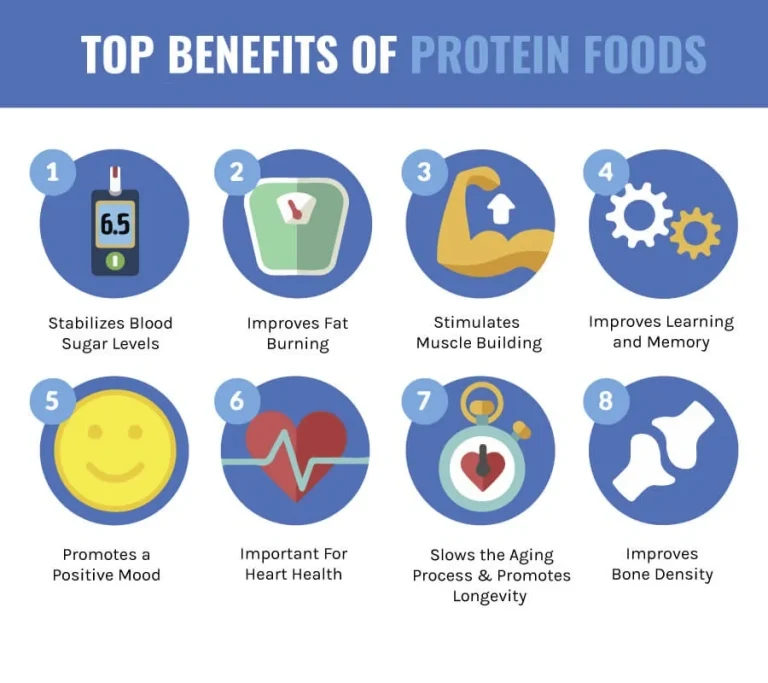Protein is one of the essential macronutrients your body needs to function properly. From muscle development and cell repair to hormone production and immune support, protein plays a central role in nearly every biological process. Whether you’re an athlete, a busy professional, or just someone trying to live healthier, understanding the benefits of protein can help you make smarter dietary choices and improve your overall well-being.
In this article, we’ll break down the science-backed advantages of consuming enough protein, the best sources to consider, and how to optimize your intake for your goals.
Understanding Protein: A Core Nutrient for Life

What Is Protein Made Of?
Protein is composed of amino acids, which are often referred to as the building blocks of life. There are 20 amino acids in total, and 9 of them are considered essential—meaning your body cannot produce them, so you must get them through your diet.
Types of Protein Sources
- Complete proteins: Contain all 9 essential amino acids (e.g., meat, dairy, eggs, quinoa, soy)
- Incomplete proteins: Missing one or more essential amino acids (e.g., most plant-based proteins)
Key Benefits of Protein for Health and Performance
Builds and Repairs Muscles
Protein supports muscle growth and repair, making it essential for bodybuilders, athletes, and anyone involved in regular physical activity. After a workout, your body uses protein to rebuild muscle fibers and strengthen tissues.
Supports Weight Management
High-protein diets are known to increase satiety (feeling full) and reduce overall calorie intake. Including more protein in your meals can help curb hunger and reduce cravings, making it easier to lose or maintain weight.
Boosts Metabolism and Fat Burning
Digesting protein requires more energy than carbs or fats—a concept known as the thermic effect of food (TEF). This means that increasing your protein intake can slightly boost your metabolism, helping you burn more calories throughout the day.
Promotes Healthy Hair, Skin, and Nails
Keratin, collagen, and elastin—proteins that form the structure of your hair, skin, and nails—require adequate dietary protein. A deficiency in protein can lead to brittle nails, hair thinning, and dull skin.
Strengthens Bones
Contrary to old myths that high protein intake harms bones, recent research shows that it actually improves bone density when consumed along with calcium-rich foods. This helps reduce the risk of fractures and osteoporosis, especially in older adults.
Enhances Recovery and Healing
Protein aids tissue regeneration, making it crucial for post-surgery recovery or healing after an injury. It supports the production of enzymes and cells involved in the repair process.
Balances Hormones
Proteins are used in the synthesis of several key hormones like insulin, glucagon, and growth hormone. These hormones regulate metabolism, blood sugar levels, and reproductive health.
Strengthens the Immune System
Antibodies—your body’s defense proteins—help identify and neutralize harmful invaders like viruses and bacteria. Consuming enough protein helps produce and maintain a robust immune response.
Best Dietary Sources of Protein
Animal-Based Sources
- Chicken, turkey, beef
- Eggs
- Greek yogurt, milk, cheese
- Fish and seafood
Plant-Based Sources
- Lentils, chickpeas, black beans
- Tofu and tempeh
- Quinoa
- Nuts and seeds
- Edamame
Protein Supplements
For those who struggle to meet daily requirements through food, protein powders (like whey, casein, or plant-based options) can be a convenient and effective option.
How Much Protein Do You Need Daily?
The Recommended Dietary Allowance (RDA) for protein is 0.8 grams per kilogram of body weight for the average adult. However, needs vary based on factors like:
- Age
- Activity level
- Health status
- Muscle-building goals
Athletes or those in intense training may need up to 1.6–2.2 grams per kilogram.
Timing and Distribution: When to Eat Protein

Instead of consuming a bulk of your protein in one meal, it’s more beneficial to spread your intake throughout the day. Aim for 20–30 grams of high-quality protein per meal to optimize muscle protein synthesis and energy levels.
Signs of Protein Deficiency
- Fatigue and muscle loss
- Weak immune function
- Swelling in hands and feet
- Slow wound healing
- Hair thinning and brittle nails
If you suspect a deficiency, consult a healthcare provider or registered dietitian.
Can You Consume Too Much Protein?
For most healthy individuals, high protein intake (up to 2.2 g/kg) is safe. However, people with pre-existing kidney conditions should consult their physician before significantly increasing their protein consumption.
Simple Tips to Add More Protein to Your Diet
- Add eggs to your breakfast
- Snack on Greek yogurt or cottage cheese
- Include beans in salads and soups
- Use protein powder in smoothies or oatmeal
- Choose whole grain breads with seeds or legumes
FAQs About the Benefits of Protein
What are the main benefits of eating more protein?
Protein supports muscle growth, boosts metabolism, promotes weight loss, strengthens bones, and helps with tissue repair.
Can protein help with weight loss?
Yes. Protein increases satiety and reduces cravings, making it easier to maintain a calorie deficit for fat loss.
Is plant-based protein as effective as animal-based protein?
Yes, but you may need to combine different plant proteins to get all essential amino acids. Soy and quinoa are complete plant proteins.
How much protein should I eat a day?
Most adults need 0.8 g/kg of body weight, but active individuals may need more, around 1.6–2.2 g/kg.
What happens if I don’t get enough protein?
Protein deficiency can lead to muscle loss, fatigue, weak immunity, and poor skin, hair, and nail health.


